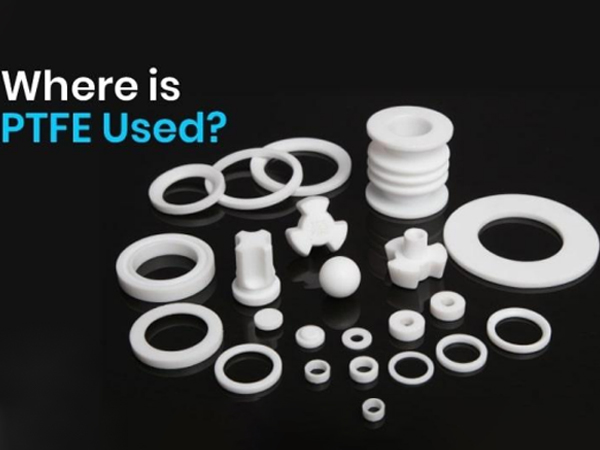
Here are some common industries and applications where PTFE is used.
Industrial Manufacturing
PTFE’s durability means it holds its ground in the harsh environment of industrial manufacturing facilities. The material is used in a considerable portion of the components and equipment in many factories, including:
Industrial coating
Due to the aforementioned ability to withstand extreme temperatures and harsh chemicals, PTFE is most commonly used as a protective coating or covering.
It usually comes in either liquid or powder form that is then used to coat various products in a wide range of industries such as:
Seat belt clips
Non-stick scissors
Non-stick frying pans
Hose liners
Aerospace engine components
Medical catheters
PTFE is also involved in the manufacturing process of many products. For example, it can be used as a coating on tanks, pumps, pipes in chemical processing facilities, or in factories that produce fragile and sensitive products such as computer microchips.
PTFE industrial coatings are also applied in the electronics industries. A classic example is the coating for electrical wires and cables, drawing on its excellent dielectric properties. This includes:
Hook-up wires inside computers
Microwaves ovens
Vehicle electrical systems
They are also used to coat coaxial cables used by internet and telephone service providers for data provision.
Not only is PTFE found in these finished devices, but it’s also frequently utilised in manufacturing them. As mentioned, the manufacturing of semiconductors, such as computer microchips, can get quite tricky due to the product’s fragile nature. This is where PTFE can be used to protect these microchips, making the most of its high resistance to chemical reactions.
PTFE films
PTFE can also come in transparent sheets or films that can be formed or shaped in many ways. They can be thermoformed, vacuumed formed, metalised, or even laminated to suit different needs and applications.
Such applications include:
Erasable anti-graffiti surface coverings
Sterile packaging
Circuitry
Anti-corrosion liners
Pharmaceutical cap liners
Radiometry equipment
Adhesives
PTFE resins
PTFE can also come in powdered resin form. This form of PTFE is often used to make tapes and membranes, and sometimes even whole tubes.
These are then used to make, for example, hydrophobic yet breathable membranes, like those used in aerospace equipment. Membranes made from PTFE are also utilised in surgically treating glaucoma.
However, this versatile material can also be used to make cables, wires, and liners. PTFE resin is also particularly moldable and can be shaped to make various components such as gaskets, valves, seals, expansion joints, and bearing pads.
PTFE fabric
PTFE can also come in fabric form, which is used in construction as part of lightweight architecture. Often, PTFE fabrics have fibreglass woven into them.
Similarly, PTFE can also be used as a textile finish or repellent to protect clothes and other fabrics.
Chemical, Medical & Pharmaceutical Industries
Because of PTFE’s excellent chemical resistance, it will not corrode or react with most chemicals, making it a handy material to use in chemical, medical and pharmaceutical settings.
PTFE is often used in chemical facilities to make tanks and containers, line pipes and tubes, and other chemical-handling equipment. This is also intended to maintain the chemicals’ purity as the PTFE will not interact with them.
Other common examples of PTFE’s usage in the chemical industry include the following:
Coating for magnetic stirrers
Pumps
Reaction vessels
Autoclaves
Impellers
Chemical containers
Heat exchanger coating
Diaphragms
Tubing for highly corrosive chemicals which will normally dissolve glass containers (i.e. hydrofluoric acid)
For similar reasons, PTFE also aids the medical and pharmaceutical industry due to its durability and chemical immunity. PTFE is also easy to clean and sterilise, making it conducive for medical environments and any other settings where contamination must be avoided.
Thus, PTFE is common in components of medical and pharmaceutical equipment such as valves, regulators and pressure control for equipment in these medical specialties:
Dentistry
Cardiopulmonary
Respiratory
Surgery
Pediatrics
Anesthesia
Dental
Surgical
Emergency care
Home care
Specific equipment examples include:
Mini-Vacutron Unit made by Allied Healthcare Products, Inc. commonly used by healthcare facilities for post-surgery convalescence
Oxygen separators used in medical equipment for patients with breathing problems